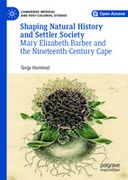Explore

Shaping Natural History and Settler Society
Tanja Hammel
2019
0 Ungluers have
Faved this Work
Login to Fave
This book explores the life and work of Mary Elizabeth Barber, a British-born settler scientist who lived in the Cape during the nineteenth century. It provides a lens into a range of subjects within the history of knowledge and science, gender and social history, postcolonial, critical heritage and archival studies. The book examines the international importance of the life and works of a marginalized scientist, the instrumentalisation of science to settlers' political concerns and reveals the pivotal but largely silenced contribution of indigenous African experts. Including a variety of material, visual and textual sources, this study explores how these artefacts are archived and displayed in museums and critically analyses their content and silences. The book traces Barber’s legacy across three continents in collections and archives, offering insights into the politics of memory and history-making. At the same time, it forges a nuanced argument, incorporating study of the North and South, the history of science and social history, and the past and the present.
This book is included in DOAB.
Why read this book? Have your say.
You must be logged in to comment.
Rights Information
Are you the author or publisher of this work? If so, you can claim it as yours by registering as an Unglue.it rights holder.Downloads
This work has been downloaded 223 times via unglue.it ebook links.
- 152 - pdf (CC BY) at OAPEN Library.
Keywords
- Africa, Sub-Saharan—History
- African history
- Colonialism & Imperialism
- Gender identity
- Gender studies, gender groups
- History
- history of science
- History: specific events & topics
- Humanities
- Imperialism
- Mathematics & science
- Regional & national history
- Science: general issues
- Social groups
- Society & culture: general
- Society & Social Sciences
- thema EDItEUR::J Society and Social Sciences::JB Society and culture: general::JBS Social groups, communities and identities::JBSF Gender studies, gender groups
- thema EDItEUR::N History and Archaeology::NH History::NHH African history
- thema EDItEUR::N History and Archaeology::NH History::NHT History: specific events and topics::NHTQ Colonialism and imperialism
- thema EDItEUR::P Mathematics and Science::PD Science: general issues::PDX History of science
Links
DOI: 10.1007/978-3-030-22639-8Editions

